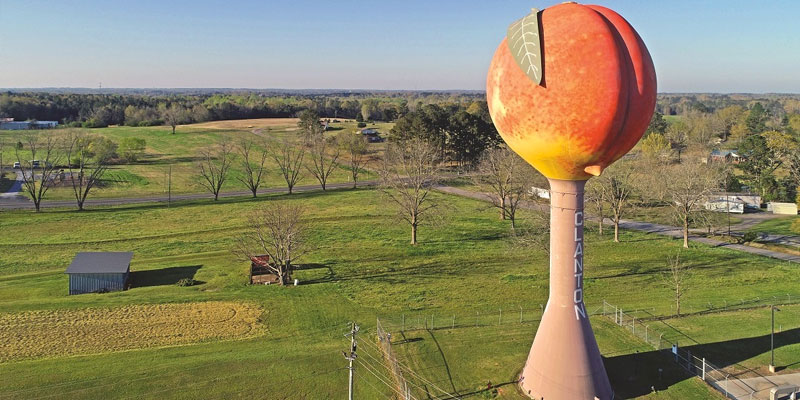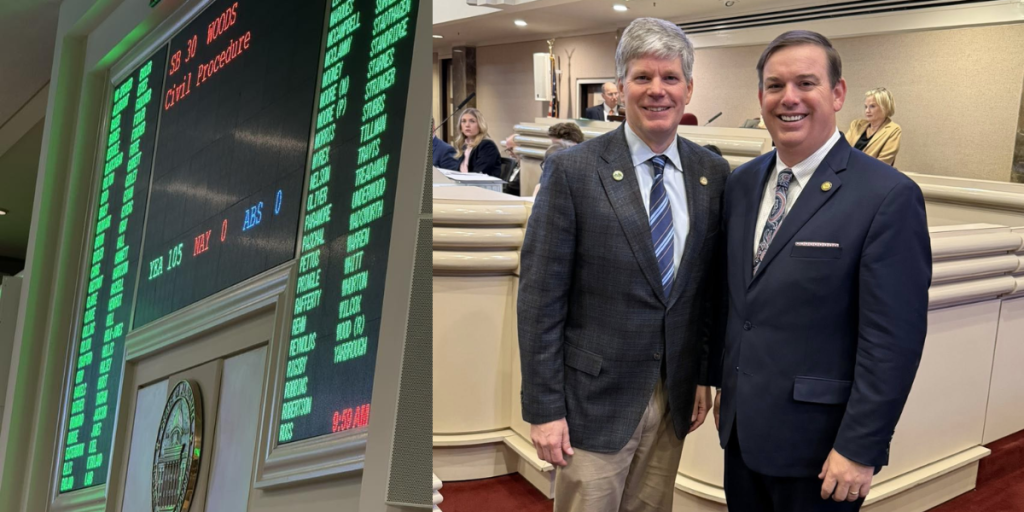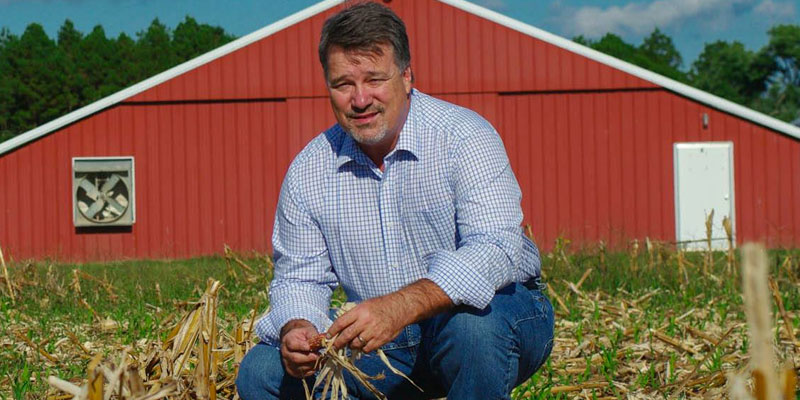It’s not fuzzy logic to guess that life could be peachy 120 feet below Clanton’s iconic fruit-shaped water tower.
Goats, geese and cows graze in the pasture beneath the creviced steel, red and yellow painted structure built for $1.2 million in 1993 at Exit 212 along Interstate 65. The road through town winds past Peachy Clean Car Wash, Peach City Pawn, Peach Auto Sales and many other businesses taking a peach stand.
At 7:45 a.m., people are waving across the street at each other, exchanging shouted greetings in the heart of the old downtown. Some sit on benches, others cross midblock between passing cars to hug old friends. There are smiles and kind words even for folks who don’t look familiar.
Main Street Café has already been open more than two hours. Inside is loud with conversation, most seats filled by customers ordering the $5.29 special: two eggs, two meats, grits, huge biscuit and drink.
A millennial sitting in the corner with an open laptop stands out like a sore thumb, but his head nods as one of the Greatest Generation walks from table to table saying, “Good morning. Good morning.”
Just down the street, Chilton County Feed & Seed on one side faces Jones Seed and Feed on the other, the two businesses having served gardeners and farmers going back nine decades. Around the corner is E.L. Klinner Furniture, a family-owned business that began here in 1925 and is selling sofas to a fifth generation of loyal customers.
The Chilton County Courthouse and more than a dozen court, government and sheriff’s offices are spread throughout downtown, surrounded by law offices of local attorneys. First Baptist Church’s campus crosses two blocks. Clanton First United Methodist Church still meets in its 1923 sanctuary and has Hispanic and addiction recovery missions nearby.
At lunch, a youthful crowd fills the Neighborhood Grill downtown, while older diners are loyal to Clara’s Café on Logan Road. On the other side of town at Kountry Kitchen, cars line the far side of the road after the large parking lot has filled. Customers stream in for the buffet served by waitresses who seem to know everyone by first name.
Yet for every old-fashioned aspect of Clanton, there seems to be a new-fangled version.
St. Vincent’s Chilton opened its 30-bed hospital in 2016, offering 20 specialties from cardiology to general surgery to family medicine. Next door is the Chilton-Clanton Campus of Jefferson State Community College in a 30,000-square-foot building providing nursing courses and core classes, in addition to a Conference & Performing Arts Center that seats 608.
On the east side of town is the bunkered State Emergency Operations Center of the Alabama Emergency Management Agency, where about 90 employees monitor state-of-the-art equipment to prepare for hazards that threaten life and property across the state.
“It’s one of our best-kept secrets,” says Billy Singleton, who wrote the history book published in conjunction with Chilton County’s 150th anniversary in 2018. “It is one of the most important facilities for Alabama and the entire region.”
The $100 million Alabama Farm Center being built near Peach Tower is expected to create up to 400 jobs and have an annual economic impact of $55 million. The 12-building complex on 500 acres is slated to include a 5,000-seat arena, 150,000-square-foot exhibition building and 400-stall barn.
Beyond the extensive medical and educational facilities, Clanton’s 8,600 residents have access to recreational fields, parks and pools unsurpassed for towns of a similar size. Alabama Power’s Lay and Mitchell dams are nearby, supplying emission-free electricity in the region and forming the major reservoirs opened by the company a century ago.
And while Heaton Pecan Farm’s barn-shaped home off Exit 208 is headquarters for gift boxes and tins ordered by customers nationwide, the community’s passion always seems to point back to Prunus persica.
“I’ve been here from the start, seen it grow up from nothing to all of this,” says Mae West Zeigler as she rearranges a rocking chair on the porch of Peach Park, which opened in 1984 and has a giant peach replica out front that is popular for summer selfies. “I meet so many people, and enjoy every minute of it.”
Zeigler says her favorite time of year is when the crowds heading to and from the Gulf Coast stop in for homemade peach ice cream churned each Wednesday by Peach Park founder Frances Gray. Her frozen dessert was named the best in the state by Alabama Living magazine in 2017.
Some Peach Park customers prefer the air-conditioned restaurant seating, but most with children head to the patio, where squirrels boldly roam the railing seeking handouts. Parents follow kids downhill to picnic tables and porch swings. A hill overlooking the farmers market has a playground, barn and 15-foot-high lighthouse centering a pool that beckons old and young alike. Even the restrooms are peach-colored.
Farms in Clanton and Chilton County account for 80 percent of Alabama’s peaches. The annual festival begun in 1947 affords growers a chance for bragging rights, with the basket judged best each year auctioned off for charity. World War I flying ace Eddie Rickenbacker flew the first prize-winning basket to Washington, D.C., where U.S. Sens. Lister Hill and John Sparkman presented it to President Harry Truman at the White House. This year’s festival begins June 22, culminating with the Peach Jam Jubilee June 29.
Durbin Farms popular stopover
Roadside vegetable stands could learn a thing or two from Durbin Farms Market. Rising from the same humble roots as the open wooden shelters found on roadsides across the nation, the business started nearly nine decades ago is now a Southern showcase.
“Marvin and Mary started peddling peaches here in ’33,” says Colby Jones, manager of the modern market his father, Danny, bought from the Durbins. “They grew apples, tomatoes and other vegetables, but peaches were their staple crop. They were open during peach season and closed the rest of the year.”
The Durbins’ destiny was set when they learned Interstate 65 would be built through local pastures and they purchased land on the east side of the proposed major highway. Durbin Farms Fruit Basket opened in 1961 but was destroyed by a tornado on Nov. 17, 1968, so they rebuilt and opened the following year on the west side of the big road.
Local farmer Steve Wilson partnered with the Durbins, growing peaches to help supply their store, beginning to sell peach ice cream in the late 1980s, and continuing to expand their business, which Wilson managed until 2005 when Jones bought the store. Jones added a boutique inside where they continue offering 24 flavors of homemade ice cream, a deli with sandwiches, pies and baked goods while expanding and diversifying other elements of the operation.
“We shuffle people in and out; they might be here 20-30 minutes at most,” says Jones, whose father-in-law, Rick Jackson, is an Alabama Power Company retiree, and brother-in-law, Travis Burnett, is a Transmission lineman. “It’s not unusual to have 200 cars stop through our parking lot in one hour.”
The Joneses grew up on farms in north Alabama where the family had a pumpkin patch open to the public in the fall. Today they offer more than 75 varieties of fruit, selling fresh apples, blueberries, nectarines, plums, strawberries and more than 30 kinds of peaches, starting around mid-May and going through mid-September. Durbin Farms is a major supplier for Sysco, as well as to wholesalers across the Southeast. James Beard Award-winning chef Chris Hastings had Durbin ship peaches to him when he was in a televised cooking competition.
“A couple from New York came in last year and bought more than 10 of our 25-pound boxes of peaches,” Jones says. “They just turned around and went back home, said it was cheaper and higher-quality to buy them down here.”
It’s not unusual to see celebrities like Tommy Tuberville searching through the slanted counters of Durbin Farms’ open market. They join the crowds curious about peach cider, pickled peaches, peach preserves and other peach products in glass jars lining the back walls beside butter and cheese from Amish Country.
“We’ve had families coming here for generations; great-grandparents bring in their great-grandkids,” says Jones. “College students come in to show their out-of-state friends what they grew up with. We put our heart and soul into giving people the best, freshest peaches and produce. That’s what we’re known for and makes us happy.”
Longtime Guardsman, lifetime teacher
Ivan Smith spent five years as brigadier general of the Alabama National Guard, followed by five years as adjutant general of the state’s 26,000 Army and Air Force troops, which at the time was the nation’s largest guard force. He was honored to be selected for those leadership roles but it’s the introduction to his adopted home in 1946 that still really moves the 85-year-old.
“When I got off the train from Nebraska, I fell in love with Alabama,” he says. “They had to use snowplows to get out of the station in Lincoln, so my mother and I were very overdressed when we arrived in Clanton. There’s nothing wrong with Nebraska; I’ve just never had the urge to go back there to live.”
The Smiths had ventured 1,000 miles after the death of his father. She’d met a soldier from Alabama and Smith had to refer to a U.S. map to find the state where his mother would be married. The 12-year-old soon moved into his new home on a farm outside Clanton. He still lives on the land willed to him by his stepfather; he still goes to the same country church he joined 73 years ago.
“Moving to Chilton County was one of the best things that ever happened to me,” says Smith. “I felt like I’d stepped into paradise.”
Idolizing a cousin who was a World War II paratrooper, Smith’s “goal in life” was to fill those Army sergeant boots upon graduation from Chilton County High in 1951. But another man stepped up and again altered Smith’s path. Vocational agriculture teacher W.A. “Bing” LeCroy gave him a $250 scholarship to Jacksonville State University, bought Smith clothing, a suitcase and drove him to the campus.
“That one thing redefined my life,” Smith says of the kind gesture by the man who influenced so many people that he became the namesake of the LeCroy Career & Technology Center in Clanton.
Smith joined the Army ROTC at Jax State and began taking classes but was soon broke. He was planning to leave college when a financial officer encouraged Smith to join the local Guard unit he commanded. Smith earned 25 cents an hour in the Guard, allowing him to complete his classes, earn a bachelor’s degree in education and a military commission in 1954, and immediately leave for Basic Officer Training at Fort Sill, Oklahoma. Thirty-three years later, he was named the JSU Military Alumnus of the Year.
Smith’s boyhood dreams were realized when he became a paratrooper – eventually jumping nearly 200 times – and a sergeant. While serving in Germany during the Cold War, another door opened: education. The University of Maryland sought soldiers who could teach math in Europe; Smith volunteered and “fell in love with teaching.”
When he returned stateside, Smith left the Army after then-State Superintendent of Education LeCroy offered him a vocational teaching post. Smith also joined the local National Guard unit, staying on for the next 30 years as he rose from 1st lieutenant to colonel, and the Clanton fort was named in his honor.
Smith had to leave the Special Forces when he became brigadier general, a position that has mandatory retirement after five years. Six months after he retired, Gov. Guy Hunt asked him to be adjutant general.
Other than his time as Alabama’s top soldier, Smith continued teaching math at the high school, junior college and college levels. He spent 40 years in the military and 60 in education while maintaining the family farm with his wife of 61 years, Sue, who also was a career teacher and counselor. They and their three grown children all have houses on the Smiths’ 60-acre farm.
“I kept remembering how much those teachers meant to me, what they did for me, and I wanted to pay it back,” says Smith. “I tried.”
Adient builds car seats
Every day, from sea to shining sea, Americans drive to work and back home, take children to practices and get fidgety in traffic jams, seldom giving a second thought to the car part closest to their body.
Every second, millions of people driving Nissan Pathfinders, Honda Pilots, Lincoln Navigators, Chevy Corvettes and other popular vehicles rest their backsides on steel framework stamped, welded and assembled at the Adient plant in Clanton. That job is always on the mind of some 900 employees at the 360,000-square-foot facility.
For nearly 20 years, Clanton workers have built seat frames and the tracks on which they move for nearly every major automaker. The success has prompted expansions on the 26-acre site, and the quality of the products led Adient to purchase the operations in 2016.
In his 17 years at the plant, Production Superintendent Justin Wilson has watched it grow from the original 50,000 square feet to 240,000 in 2002 and to the current size in 2012. He helped build BMW X5 seats for one of the first plant customers and continues today supervising seat production for a dozen different automakers. Many of the employees work on the new Ford Expedition seating line, but Adient is producing seats for 23 other cars and trucks.
Wilson watches as a large coil of tightly wound thin steel rolls into 100-ton to 150-ton pressure stamping machines, which every second push out a piece cut into patterns specific to each vehicle. Workers transfer the pieces to other machines that further fold the steel into upper and lower rails. Some of the heavy work is done by robots behind clear, locked partitions. Robots weld, apply special rust-preventive coatings and paint, and move parts along conveyor lines.
The detailed work is done by people using their hands and pneumatic screwdrivers, sanders and other specialized equipment. They merge inner and outer railings, add ball bearings and meld segments until each closely inspected frame is packaged for shipping. Fabric is added at other plants. The Clanton facility ships up to 30 million rails and more than 2 million seat frames each year.
“We’re dealing with very tight safety tolerances. In the automotive world, safety is a major concern,” Wilson says. “And we have to ensure that the creature comforts are met, that the seats are quiet and smooth operating.”
Human Resources Manager Judy Benson has been at the plant since its first day, remaining through ownership changes from CRH, to Johnson Controls to Adient. She notes there are many other longtime employees, such as Operations Manager Jimmy Simpler, while Plant Manager Danny Aaron relocated to Alabama from Philadelphia last year.
“Fifty-four percent of our employees live in Chilton County and 48 percent are female,” says Benson, whose husband, Neil, works for Alabama Power. “We have a very diverse workforce, which makes Adient a great place for anyone to work.”
The original day the music died
Ken Gilliland taxis a crop duster along the Chilton County Airport runway, gunning the engine as he checks to ensure the craft has been properly serviced. He’s gained an international reputation the past 20 years working on airplanes and helicopters.
Flying machines from across the country line the floor of the former Tuskegee Airmen metal hangar that was moved to Clanton in 1948. The massive, historic structure dwarfs the brick-walled hangar next door built through the Works Progress Administration in 1937, but the smaller hangar holds haunting memories of a tragedy 65 years ago on Gragg Field.
On June 30, 1954, the WPA hangar was packed for a Peach Festival concert by the Blackwood Brothers Quartet. Because the runway was unlighted, minutes before he would take the stage, R.W. Blackwood decided to fly the group’s Beechwood Model 18 around the airport. He took bass singer/copilot Bill Lyles up to “get the lay of the field.” They were joined on the spur of the moment by Airman 2nd Class Johnny Ogburn Jr., 20, the son of the festival founder.
Most of the huge crowd watched the plane take off as darkness fell on the field. Blackwood circled overhead several times, then missed his first attempt at landing. On the second attempt, his twin-engine plane bounced off the runway, went into a vertical climb, hung momentarily high in the air and flipped, diving into the runway and bursting into flames. Rescue attempts were futile.
“At first, I thought it was some kind of prank, but all of a sudden people were running out of the hangar onto the landing field,” says Billy Joe Driver, Clanton’s nine-term mayor who witnessed the crash. “We just couldn’t believe what had happened. It didn’t seem real.”
The Blackwood Brothers would soon reorganize with new members, earn the admiration of Elvis Presley (singing at Blackwood’s funeral) and become synonymous with gospel music, continuing today performing with new members. Blackwood family members often visit the granite monument alongside the runway that honors the trio killed in the crash.
For Chilton Countians who were alive in 1954, the catastrophe brings a reaction similar to what later Americans would feel about the Kennedy assassination or 9/11, recalling exactly where they were when they heard the bad news.
“It’s one of those things you try to forget but can’t,” says Driver, who went to the crash site after the wreckage cooled and picked up a couple of melted Blackwood Brothers records he has at home. “It’s still hard to believe. It was beyond imagination.”
The airport has survived the tragedy and thrives as never before in its 82-year history.
“For many years the airport was not only for transportation but was the social center of Clanton, the site of county fairs and the Peach Festival,” says Billy Singleton, a commercial pilot who is president of the Chilton County Chamber of Commerce and secretary of the Airport Authority. “The airport has essentially evolved into something that provides benefits for all the citizens of the county. We are now generating revenue for operations that we don’t have to ask taxpayers to support.”
Rent comes from airport hangars that store 30 airplanes, as well as from Gilliland’s B&G Flying Service, which employs seven mechanics. Airport facilities have been modernized, but Singleton is setting his sights on runway lighting improvements and a 1,000-foot-long extension that would allow corporate jets to land in Clanton. He expects the safety upgrades to be made within two years.
Alabama Power office
Business Office Manager Van Forrester at the sprawling Clanton Operating Center is responsible for smooth customer service operations in parts of Autauga, Chilton and Coosa counties. He’s held his current post for more than five years of his 38 with Alabama Power. Forrester is married to Diane, a Clanton native, and they have two grown children, Tara and Casey, and five grandchildren: Maddi, Lauren, Adam, David and Chandler.
Active in the community, Forrester is chairman of the Chilton County Industrial Development Board, on the Education Workforce Development Council, and the Jefferson State Community College Community and Corporate Advisory Board. In 2015, he was president and in 2016 chairman of the board of the Chilton County Chamber of Commerce.
Forrester started with Alabama Power in the Southern Division Call Center, moved to the Montgomery District Office, then to the Alabama Science Center, returned to the Montgomery District, and before his current job was a technical representative in the Southern Division Marketing & Major Accounts Automotive Segment.
Forrester first came to Chilton County as a 10th-grader, when his father, the late Bill Forrester, transferred to Lay Dam as an electrician, later becoming superintendent there and at Mitchell Dam during a major renovation.
Customer Service Representative Rosemary Johnson has been with the company for 40 years – mostly in Fossil Generation at Gaston Steam Plant. She’s been in Southern Division 13 years, the past eight years at the Clanton Office.
“Clanton is home and I am very blessed to be at the Clanton Office working with our customers every day to help them with any concerns or problems they may have,” Johnson says. “Sometimes they just need someone to talk to.”
Alabama Power has always been a part of Johnson’s life. Her 91-year-old father, Robert E. Lee, is a company retiree and she was born in the Jordan Dam village.
Johnson met her future husband, Lighting Services Sales Representative Terry Johnson, when he was hired at Gaston and they have been married for 33 years this August.
Field Service Representative Kyle Lawrence has been with the company for 28 years, the past two in Clanton. He and his wife, Missy, have two grown children, Lee and Dalton, and two grandchildren: Brycen, 5, and Korie Elizabeth, 2.
Customer Service Representative Shannen Porter has worked for Alabama Power for 20 years after starting in the Montevallo Business Office. She moved to the Calera Business Office and the past eight years has been in the Clanton Business Office.
She lives in Clanton with husband, Brandon, who is an E&I journeyman at Gaston Steam Plant.
Customer Service Rep Tanner Horton has been with the company 13 years and in Clanton six years. She is married to Dustin and they have two sons: Wyatt, 11, and Landon, 8.
Customer Service Representative Annette Rowe has been with the company for 17 years, working her entire career in the Clanton Office. Her primary job has always been as coordinator for the Conference Center.
Rowe is an active member of APSO, serving as the Clanton Chapter chair for several years. She presents Safe-T-Opolis programs at schools across Southern Division.
She’s been married to Barry Rowe for 27 years. They were “recently blessed” with the birth of their first grandson, Bohannon. Their son, Shea, serves in the Navy and their daughter, Catherine, is in college pursuing a registered nurse degree.
Rowe is a member of Thorsby Baptist Church, sings on the Praise Team and in the adult choir, and teaches children’s choir and Mission Friends (preschool).
“I enjoy working for a company that promotes the importance of family and being involved with your community,” Rowe says.
Famous sons
Clanton has had its fair share of famous folks in film, music and sports. Many have moved on to bigger places but most still check in on their hometown from time to time. Among the most well-known:
-
- Clay Carroll. A member of the Cincinnati Reds Hall of Fame, Carroll grew up the son of a local mill worker and learned to play baseball in pickup games and school. The 78-year-old is a member of the Alabama Sports Hall of Fame based on his 15 years as a relief pitcher for the Milwaukee and Atlanta Braves, St. Louis Cardinals, Pittsburgh Pirates, Chicago White Sox and Reds. Carroll was a two-time All-Star and National League saves leader before becoming a World Series champion with Cincinnati in 1975. He had a starring role pitching in five of the six games of the 1970 World Series.
- Wesley Dennis. Singing in bars at night, installing windshields by day, Dennis worked his way up to a contract with Mercury Nashville Records in 1995, releasing a self-titled album that produced three chart singles: “I Don’t Know (But I’ve Been Told),” “Don’t Make Me Feel at Home” and “Who’s Counting.” Off the success of his debut record, Dennis toured with country star Alan Jackson. His second album was less successful and Dennis was inactive for about a decade until 2012, when he released “Country Enough.” The 57-year-old continues recording and performing around the Southeast.
- Mac Powell. Powell sang in his church choir, listened to his dad’s vinyl record collection and went to Chilton County High School before his family moved to Atlanta. Merging music and faith, Powell started Third Day, a Christian rock band that over 25 years sold 10 million albums and earned 24 Dove Awards, four Grammy Awards and other accolades. He was inducted into the Georgia Music Hall of Fame before forming in 2018 Mac Powell and the Family Reunion, which performed in May at the Lyric Theatre in Birmingham.
- Andrew Roy. Raised in Clanton, 23-year-old Roy is pursuing an acting career in Los Angeles. He has appeared in the films “Curse of Pirate Death” and “Blink,” but is best known for TV roles. His debut was in “Greek,” followed by portraying Griffin in the series “iCarly” beginning in 2009. Roy guest-starred as Jesse, the love interest of Miley Cyrus on “Hannah Montana.” He had a role on “Lincoln Heights” before being cast in the film “Secretariat” and in 2011 landing the lead in Steven Spielberg’s “Falling Skies.” Roy in 2017 starred as Joel in the TV show “Timeless” and on TNT’s “The Last Ship.”
- Grayson Russell. The film and television actor has turned his sights toward a music career, but the 21-year-old is widely known for roles in “Talladega Nights: The Ballad of Ricky Bobby” and the “Diary of a Wimpy Kid” series. While Russell resides in Nashville, his mother, Crystal, continues working at an auditing firm in Clanton. Russell began acting at age 6 in local TV commercials, advanced to regional ads and then won an open casting call for his memorable role as Texas Ranger Bobby in “Talladega Nights.” He graduated from Chilton County High before appearing in Disney and independent films.
This story originally appeared in Alabama Power’s Powergrams.
(Courtesy of Alabama NewsCenter)













